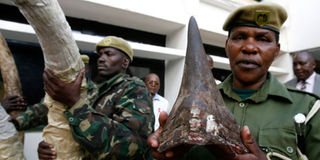Row over new move to allow ivory trade

Kenya Wildlife Services (KWS) rangers display elephant tusks and rhino horns intercepted at the Jomo Kenyatta International Airport, Nairobi in July 2009. The smuggled consignment of ivory weighing 280kg and rhino horns weighing 18kg was on transit from Mozambique to Laos. Photo/ FILE
Kenya is opposing a move by Tanzania to reintroduce the sale of ivory, saying it will increase elephant poaching in the region.
The Kenya Wildlife Service says Tanzania is taking advantage of a “malicious loophole” and proposing the sale of ivory during an international moratorium.
“We are convinced Tanzania has contravened the spirit of the (moratorium) agreement and Kenya is totally opposed to their proposal to sell ivory,” said Mr Patrick Omondi, a KWS senior assistant director.
Elephant numbers
However, Tanzania’s director of Wildlife Erasmus Tarimo disagrees and says they are following the agreements currently in place.
“We’re doing what is best for our elephant population,” he said in a phone interview, adding that revenues from the sale would go towards elephant conservation.
Ivory trade has been closely regulated since the Convention on International Trade in Endangered Species imposed a worldwide ban in 1989. The number of African elephants had dropped from 1.3 million in 1973 to less than 500,000, due mainly to poaching, when the ban was put in place. Kenya has about 35,000 elephants.
Tanzania’s proposal to down-list the African elephant from Appendix I (facing extinction) to Appendix II (less threatened) is joined by Zambia which has submitted a similar proposal of their own.
Kenya is not alone in the opposition to this sale. Ghana, Liberia, Sierra Leone, Togo, Mali, Rwanda, and the Republic of Congo are co-sponsors of the proposal on behalf of 21 other nations that support it, said Mr Omondi.
What concerns the KWS is not just that Tanzania will be selling instead of burning their stockpiles, but that they did not consult Kenya in spite of shared elephant populations.




